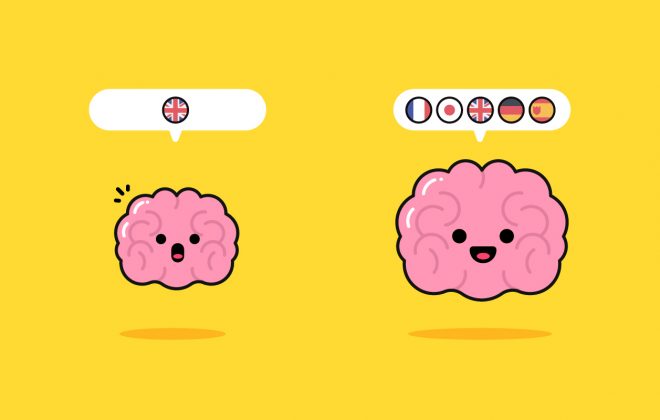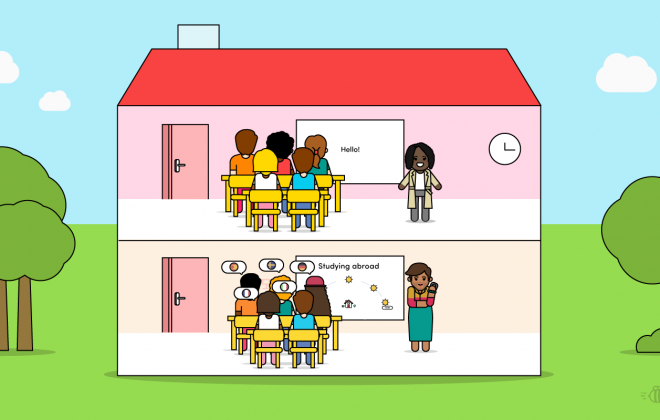The Benefits of Being Bilingual
What does bilingual mean?
Well, there are several definitions. Some agree that you are bilingual if you speak two languages at a (near) native level; others say it is just a matter of using the two languages actively in your day-to-day life. The fluency of these languages is then left up to debate, but generally speaking, a person should be able to communicate fluently in those two languages to be labelled bilingual. It is often assumed that one has to have grown up speaking two languages – but you can also obtain fluency in a language later on in life.
Whichever way you choose to define it, successful and fluid communication in both languages is key 🙂
Now that we have an idea of what bilingual means, we can look at some of the many benefits it brings! The advantages span over many areas of life, from personal and cultural, to professional areas. There are even positive effects on one’s cognitive health! Let’s start with an obvious one:
Being bilingual boosts your career
“Learning another language helps you get a better job!” We’ve been hounded with that fact ever since school – but not only does it broaden one’s prospects of better job placement, it also plays a role in how high a salary one could earn. Speaking another language gives you a competitive edge over other applicants and also makes you a valuable employee. A second language can open up opportunities to work abroad (perhaps a transfer to another branch), to get a raise, and to work in higher paying, more international fields, too. It is a huge asset in plenty of industries, such as tourism and travel, journalism and publishing, international relations, sales, management,… There are more career choices than you might think!
Apart from being able to speak another language, being bilingual also helps on a much broader level – it can improve your communication and problem-solving skills. This is because:
Being bilingual revamps the brain
If you have learned or are currently learning a foreign language, you will probably agree with the sentiment that it “rewires” your brain. It may sound strange, but it does just that! Learning another language changes our way of thinking, especially once one reaches a higher level of fluency. This improves problem-solving skills and you can become better at making decisions. This benefits communication in different ways, mainly due to the fact that your brain is better accustomed to filtering out unnecessary information.
Just an example: bilingual brains think in two languages simultaneously. A fun characteristic of a bilingual person is the ability to switch between two languages rather easily. They can also have conversations in different languages at the same time and still be able to keep up with each one with (seemingly) little effort!
A foreign language is not only beneficial to our career prospects, but it also helps to build competence in communication and enhance problem-solving skills. The list of advantages goes on, but the most valuable reward of being bilingual is the way it can broaden our view of the world.
Each language brings with it a new perspective, which helps greatly in the way we understand and empathize with others. This ties in with the “rewiring” of the brain we touched upon, and this recalibration goes deeper than multi-tasking…

Being bilingual enriches your personal life
The most common reasons for learning another language are for family, friends and forming new relationships. Whether your parents wanted to ensure you could understand your grandparents, or you have moved to a new country and are trying to make new friends, or you have fallen in love and want to better understand your partner’s perspective… These are among the most motivating factors, and the benefits are invaluable to our quality of life.
Through the power of language, a person is able to connect with and understand other cultures. The perspectives gained from this give insight into how other people think and react in certain situations. The same goes for your inner self – your sense of judgment changes by giving yourself another point of view when you need one.
Take me for example: as an English-German bilingual, I feel I can not only understand but also personify each language’s mentality. I find it easier to be diplomatic and fair using a German mindset and vocabulary. My English brain is much better at conveying emotions and being empathetic. “German Me” can be brutally honest and frank (almost rude), while “English Me” is very talented at sugar-coating (a bit too polite). The two work together quite well, creating a laid-back, spontaneous joker who likes structured work times and a strict recycling system, but can go with the flow (sometimes).
The two languages bring with them two personalities, in a sense, which many bilingual people deem practical in their daily lives.
Whatever combination of languages you speak, you will undeniably find that it enhances your perception of the world around you. By building bridges between cultures, ultimately between people, language unites us and helps us rid ourselves of the many misconceptions and prejudices that are all too often propagated by a fear of the unknown.
If you are not bilingual yet, it is never too late to start! You can feel the effects of rewiring your brain early on, be it the logic of German (die Schildkröte = shield toad = turtle) or the romance of Spanish (el flechazo = arrow shot = love at first sight). Take the plunge and enjoy!
Want to learn more?
If you’re feeling inspired, sign up below for a free two-week trial and a Live Lesson with a private qualified tutor to start speaking a new language for real! Our classes are structured around exercises created by language teachers, so there’ll be no awkward silences – we promise! 😉
And don’t forget to check out our Facebook, Twitter and Instagram pages for more language content!



